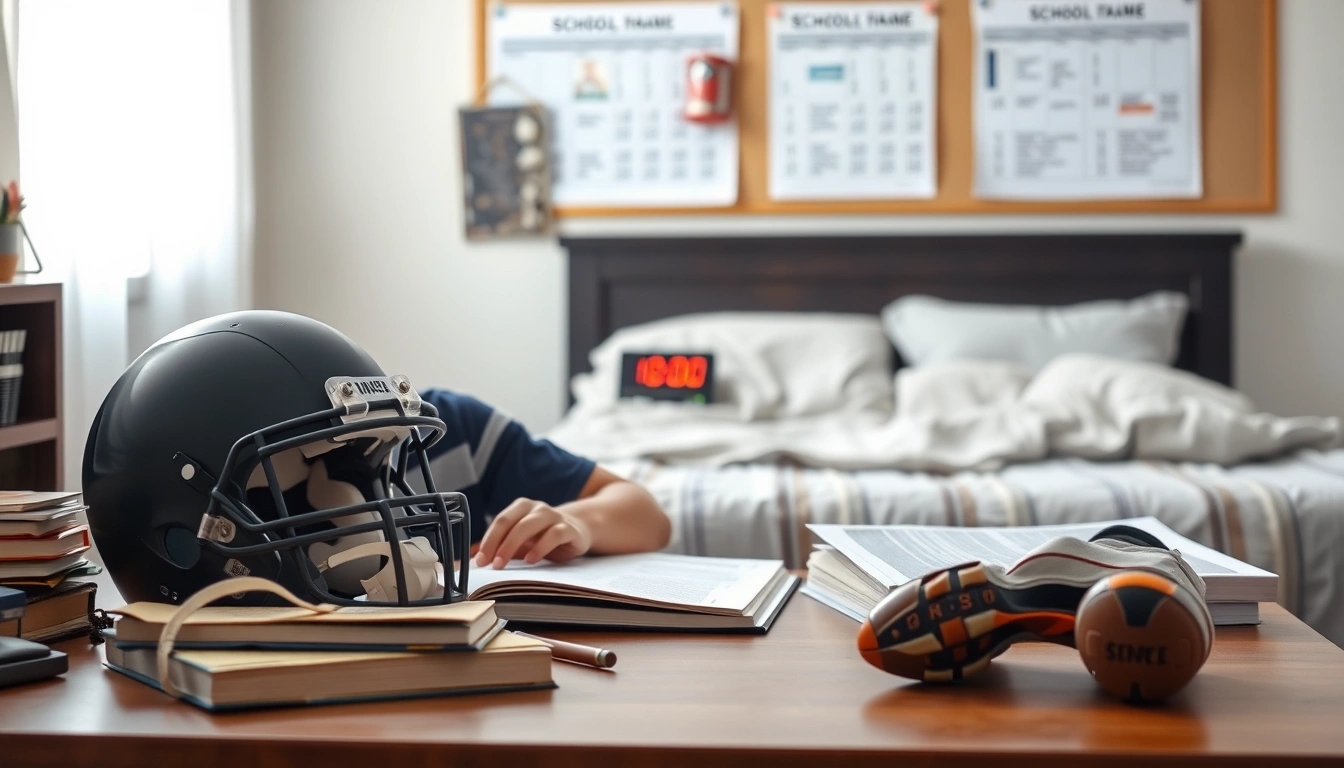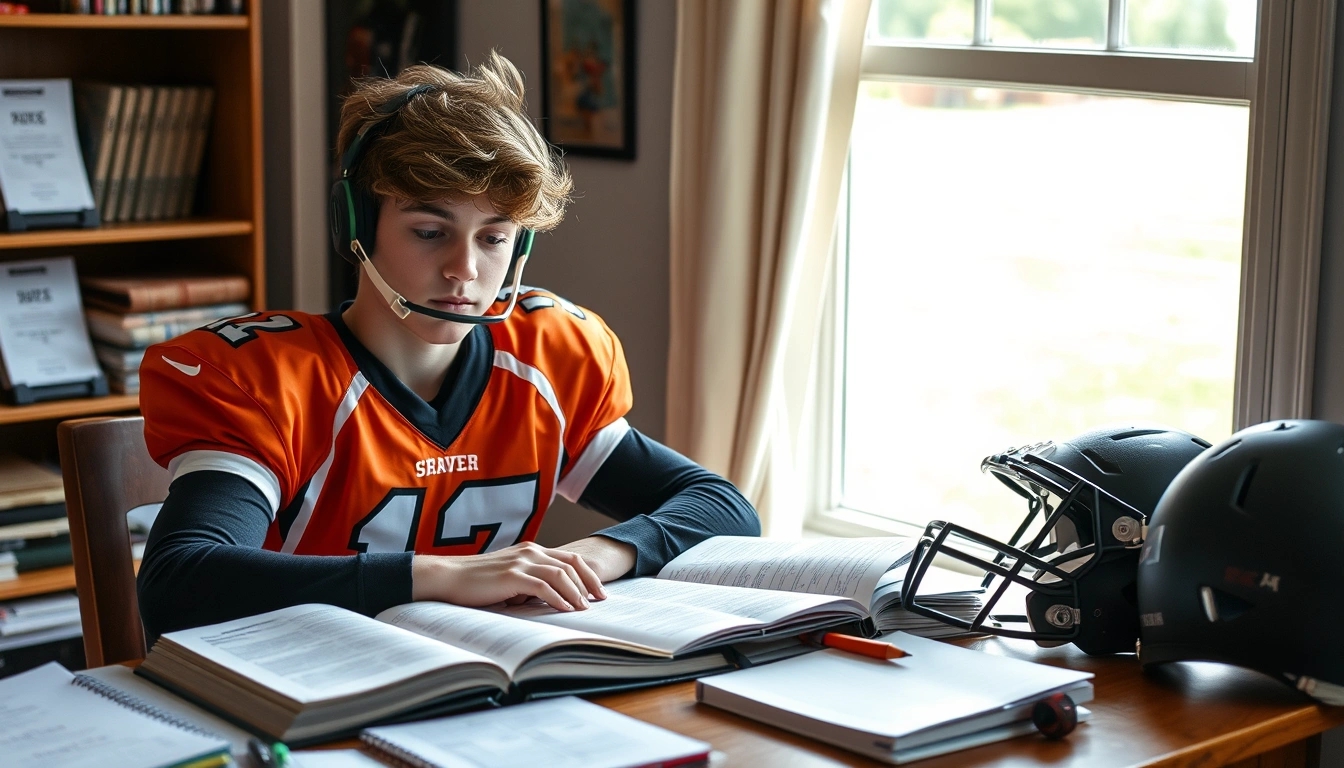Alright, let’s be honest: trying to keep up with school assignments while chasing down a football on the field feels like juggling flaming torches—blindfolded. You’re not just a student or an athlete; you’re both, and sometimes it feels like neither gets the attention it deserves. But hey, it’s not impossible. This piece dives into the nitty-gritty of how young athletes can actually thrive in both worlds without losing their minds.
First off, time management isn’t just a buzzword coaches throw around to sound smart. It’s your lifeline. Imagine your week as a football playbook—every hour counts, and you gotta call the right plays. Prioritize your tasks like you prioritize plays: what’s urgent, what can wait, and what’s a total time-suck. Don’t be that kid who crams for a test the night before and then wonders why the ball slipped through his fingers during practice.
| Time Management Tips | Why It Works |
|---|---|
| Use a planner or app to schedule homework and practice | Keeps you organized and reduces last-minute panic |
| Break tasks into chunks | Makes big assignments less scary and more doable |
| Set specific goals for each study session | Boosts focus and productivity |
Now, let’s talk about the academic pressure cooker. School isn’t just about tests and essays—it’s a stress factory. Add football commitments, and suddenly you’re juggling two full-time gigs. Stress messes with your head and your game. Ever tried to catch a pass when your brain’s stuck on a math problem? Yeah, not pretty. The trick? Find ways to chill out, whether that’s through breathing exercises, talking to someone, or just zoning out with some music.
- Recognize when stress is getting out of hand
- Don’t be afraid to ask for help from teachers or coaches
- Make time for hobbies or downtime—seriously, it’s not wasted time
And what about those late-night practices clashing with homework marathons? Training vs. Homework is a classic showdown. You might feel like you’re burning the candle at both ends, but smart scheduling can save you from turning into a zombie. Try knocking out easier homework before practice and saving the heavy stuff for when your brain’s fresh. Also, don’t underestimate the power of short breaks to recharge.
Sample Evening Schedule:5:00 PM - Practice7:00 PM - Quick dinner & rest7:30 PM - Homework (start with easy tasks)8:30 PM - Break (stretch, hydrate)8:45 PM - Tough assignments10:00 PM - Wind down for sleep
Of course, none of this works if you’re flying solo. Coaches and teachers can either be your biggest fans or your biggest headaches. Communication is key—let them know your schedule, your struggles, and your wins. They’re usually more understanding than you think, and sometimes they’ll cut you some slack if you just ask.
In the end, it’s a messy, imperfect balancing act. But with some grit, a bit of planning, and a dash of humor, young athletes can absolutely rock both school and the gridiron. Just remember: it’s okay to stumble, to have off days, and sometimes to just sit on the bench and catch your breath.
Time Management: The Ultimate Game Plan
Balancing school and youth football? Yeah, it’s like trying to juggle flaming torches while riding a unicycle—thrilling but nerve-wracking. If you’re thinking, “How the heck do I get all my homework done *and* make it to practice without turning into a zombie?” you’re not alone. Mastering your schedule isn’t just a nice-to-have; it’s the secret sauce to staying sane and scoring touchdowns in both classrooms and on the field.
Let’s be real—time is the biggest opponent here. You’ve got assignments piling up like a mountain, and football drills that don’t care if you’re tired or not. But don’t freak out just yet. The key is prioritizing tasks so you don’t drop the ball (pun intended). Start by breaking your day into chunks. Think of it like a game plan:
- Morning Warm-Up: Quick review of schoolwork or prep for tests.
- Midday Hustle: Classes and quick breaks to recharge.
- Afternoon Practice: Football drills, scrimmages, and team meetings.
- Evening Cooldown: Homework, revision, and maybe some chill time.
Sounds simple, but sticking to it? That’s where the real challenge lives. Here’s a practical tip: Use a planner or an app. Seriously, those digital buddies can remind you when to switch gears—no more “Oops, I forgot the essay!” moments. A quick table might help visualize this better:
| Time Slot | Activity | Goal |
|---|---|---|
| 6:30 AM – 7:30 AM | Review notes / light study | Prep brain for the day |
| 8:00 AM – 3:00 PM | School classes | Absorb knowledge, take notes |
| 4:00 PM – 6:00 PM | Football practice | Improve skills, teamwork |
| 7:00 PM – 9:00 PM | Homework and study | Complete assignments, prep for tests |
| 9:30 PM onward | Relax / sleep | Recharge for tomorrow |
But hey, sometimes life throws a curveball—maybe a surprise quiz or a last-minute practice extension. That’s when you gotta be flexible. Prioritize the urgent stuff first. If your math test is tomorrow, maybe skip that extra 30 minutes of video game time (ugh, I know, the struggle is real). And don’t be shy about asking for help—whether it’s a coach understanding your study crunch or a teacher cutting you some slack after a tough game.
Here’s a little secret: not every day will be perfect. Some days, you’ll feel like you’re barely keeping your head above water. Others, you’ll crush it and wonder why you ever stressed. The trick is to keep adjusting your game plan. Reflect weekly: What worked? What tanked? Then tweak accordingly.
- Tip #1: Set specific goals for both school and football weekly. Vague goals vague results.
- Tip #2: Break big projects into bite-sized tasks. Nobody writes a 10-page paper in one night (unless you’re a superhero).
- Tip #3: Don’t forget breaks! Even the best players need a breather.
So, if you want to be that kid who’s rocking both the classroom and the gridiron, start treating your schedule like a coach treats a playbook. Plan, prioritize, and pivot when needed. You might stumble, sure, but with a solid time management game plan, you’ll be winning in no time.
Remember: It’s not about being perfect. It’s about showing up and giving your best—on the field and in the classroom. Now, go get ‘em, champ!
The Academic Pressure Cooker
School and football—a combo that can sometimes feel like a pressure cooker about to blow its lid. Seriously, juggling homework, tests, and football practice isn’t just a walk in the park. It’s more like trying to score a last-minute touchdown while solving a math problem in your head. Stress? Oh, it’s definitely there, lurking like a defensive lineman ready to tackle you down the moment you slack off.
Let’s be real: stress doesn’t just mess with your mood; it can seriously tank your performance on both the field and in the classroom. You might find yourself staring blankly at a textbook one minute and then missing a pass the next. Why? Because your brain’s running on empty, overloaded with deadlines, drills, and expectations from all sides. It’s like trying to play a game with a cracked helmet—your head just can’t take the hits.
- Physical Symptoms: Headaches, fatigue, and even stomachaches are common signs that stress is creeping in.
- Mental Fog: Difficulty concentrating, forgetfulness, and feeling overwhelmed can sabotage your study sessions and game focus.
- Emotional Rollercoaster: Mood swings, irritability, and anxiety often tag along for the ride.
Now, before you throw your cleats in the trash and swear off school forever, let’s talk solutions. Keeping your cool isn’t just some fluffy advice; it’s a game-changer. Here are some practical ways to keep stress from benching you:
| Problem | Solution |
|---|---|
| Overloaded Schedule | Break your day into chunks. Use planners or apps to slot in study time, practice, and rest. Prioritize tasks so nothing sneaks up on you. |
| Performance Anxiety | Practice mindfulness or deep breathing exercises. Visualize success both on tests and on the field—it’s not just hype, it works. |
| Physical Exhaustion | Don’t skip meals or sleep. Your body needs fuel and rest to keep up with the demands of school and sports. |
And hey, don’t forget to lean on your support crew—friends, family, coaches, and teachers. Sometimes just venting about a tough day can take the edge off. Plus, they might have some killer advice or help you spot when you’re pushing too hard.
Tip: When stress hits hard, try this quick breathing trick:- Inhale slowly for 4 seconds- Hold your breath for 7 seconds- Exhale completely for 8 secondsRepeat 3 times. Feels weird at first, but trust me, it calms the storm inside your head.
So yeah, school can be a beast, especially when football’s calling your name too. But with a few smart moves and a bit of grit, you can keep stress in check and perform like the champ you’re meant to be. After all, it’s all about balance—keeping your eyes on the prize without losing your cool in the chaos.
Remember: Stress isn’t the enemy; it’s how you handle it that counts. Lace up, hit the books, and don’t let the pressure cooker blow your game.

Training vs. Homework: Finding the Sweet Spot
Balancing those grueling late-night football practices with a mountain of homework? Yeah, it’s about as easy as trying to catch a greased pig at a county fair. You’re drained after running drills, sprints, and tackling drills, then you come home to face a stack of textbooks that looks taller than your cleats. The struggle is real, but hey, it’s not impossible. Let’s dive into some no-nonsense strategies to keep both your grades and game sharp without sacrificing sleep or sanity.
First off, let’s be honest: sometimes, your brain just refuses to cooperate after a brutal practice. You’re wiped out, and the last thing you want is to stare at algebra problems or history notes. But here’s a little secret — quality beats quantity. Instead of marathon study sessions after practice, break your homework into smaller chunks. Even 20 minutes of focused work is better than an hour of half-hearted staring at your notes.
- Tip 1: Use a timer. Set 20-25 minute blocks with 5-minute breaks. This Pomodoro technique isn’t just for office drones; it works wonders when your brain’s fried.
- Tip 2: Prioritize assignments. Knock out the toughest or most urgent stuff first, when your energy is still hanging in there.
- Tip 3: Don’t be shy to ask for help. Coaches, teachers, parents — they’re not just there to nag. Sometimes a quick chat can clear up confusion faster than banging your head on the desk.
| Challenge | Strategy | Why It Works |
|---|---|---|
| Late practice ends at 8 PM | Prepare homework materials before practice | Reduces time wasted looking for books and notes when tired |
| Homework feels overwhelming | Break tasks into smaller, manageable parts | Prevents burnout and keeps motivation up |
| Falling asleep during study | Study earlier in the day or use active methods (flashcards, quizzes) | Engages brain better than passive reading after exhaustion |
Now, let’s talk about that sneaky villain: procrastination. You probably think, “I’ll just chill for a bit after practice,” and next thing you know, it’s midnight and you’re scrambling to finish a paper due tomorrow. Been there, done that, got the stress sweat to prove it. The trick is to start your homework before practice if you can — even 30 minutes can make a huge difference. And if your schedule’s packed tighter than a linebacker’s helmet, try to squeeze in a quick review during lunch or breaks at school.
One more thing — don’t forget to cut yourself some slack. Some nights, you’ll nail the balance perfectly. Other times, you’ll flop hard. It’s called being human. Just pick yourself up and keep hustling. Remember, coaches and teachers usually appreciate effort over perfection. So, keep the communication lines open. Tell your coach if you’re drowning in assignments, and your teacher if football’s eating up your study time. Most of the time, they’ll work with you — because hey, they want you to succeed too.
Quick Homework vs. Training Checklist:- Pack your backpack with homework before practice- Set a timer for study sessions- Break assignments into bite-sized chunks- Use active study methods (quiz yourself, flashcards)- Communicate with coaches and teachers early- Prioritize sleep: no all-nighters if you can help it
So yeah, balancing training and homework is a juggling act worthy of a circus performer. But with some planning, grit, and a dash of stubbornness, you can find that sweet spot where your grades don’t tank and your game stays strong. Just remember, it’s a marathon, not a sprint — and sometimes the best play is knowing when to call a timeout and recharge.
Coach and Teacher Dynamics
Let’s be real: juggling the expectations of both your coach and your teachers is like trying to keep two stubborn cats happy at the same time. Each has their own agenda, and sometimes, it feels like you’re stuck in the middle of a tug-of-war match where the rope is your time and sanity. But here’s the kicker — understanding how these two key players see your dual commitments can seriously tip the scales in your favor. And no, it’s not just about saying “yes” and nodding along; it’s about real communication, setting boundaries, and finding common ground.
First off, coaches tend to have a laser focus on your athletic performance. They want you on the field, giving 110%, sweating buckets, and showing up for every practice and game. Meanwhile, teachers? They’re all about deadlines, grades, and making sure you’re not falling behind in algebra or history. When these two worlds collide, it can feel like you’re caught in a crossfire. But here’s a little secret: both sides generally want the same thing — your success, just in different arenas.
- Tip 1: Keep your coach in the loop about your academic deadlines. They might be more understanding than you think if you explain you can’t miss that big test or project.
- Tip 2: Likewise, tell your teachers about your football schedule. They often appreciate the hustle and might offer some flexibility — like extensions or extra help.
- Tip 3: Set up a weekly check-in with both parties if possible. It sounds fancy, but even a quick chat can prevent misunderstandings that spiral out of control.
| Challenge | Coach’s Perspective | Teacher’s Perspective | Communication Tip |
|---|---|---|---|
| Missing Practice for Study | Frustration over lost training time | Supportive if academic work is prioritized | Explain importance of study, offer to make up drills |
| Late Homework Due to Game | Unaware of academic deadlines | Concerned about falling behind | Notify teachers ahead, ask for extensions |
| Fatigue Affecting Performance | Wants peak physical output | Wants alertness in class | Discuss scheduling to balance rest |
Now, don’t get me wrong — sometimes, communication feels like yelling into the void, especially when everyone’s busy or stressed out. But here’s the thing: if you don’t speak up, assumptions fill the silence, and that’s when trouble brews. Coaches might think you’re slacking off academically, while teachers might assume you’re skipping homework because you’d rather be on the field. Neither is usually true, but without a clear line of communication, misunderstandings pile up like dirty laundry.
Another curveball? The occasional clash of priorities. Imagine your coach scheduling an important practice right when you have a big exam. Or a teacher assigning a group project due the same week as playoffs. It’s a classic “pick your poison” scenario, and it sucks. But here’s where your negotiation skills come into play — and yes, you have to channel your inner diplomat.
- Pro tip: Try proposing alternatives. Can practice be shifted? Can you get extra time on assignments? Sometimes the answer is yes, sometimes no, but at least you tried.
- Remember: Both coaches and teachers want you to succeed, just in different ways. Showing them you respect their demands while advocating for your own needs builds trust.
In the end, managing coach and teacher dynamics isn’t about being perfect — it’s about being honest, proactive, and sometimes a little bold. Don’t wait until you’re drowning in missed assignments or exhausted from overtraining. Speak up early, keep everyone informed, and watch how your balancing act starts to feel a little less like walking a tightrope and more like a smooth dance.
Summary:
- Communication is the secret weapon in balancing football and academics.
- Both coaches and teachers usually want your success, but their expectations differ.
- Be proactive in sharing schedules and challenges to avoid misunderstandings.
- Negotiate and seek compromises when conflicts arise.
Bottom line: Your voice is your MVP here. Use it wisely.
Nutrition and Energy Levels
Fueling your body right isn’t just about stuffing down whatever’s on hand before practice or cramming snacks between study sessions. No, it’s way more nuanced—and honestly, half the battle when you’re trying to juggle school and youth football. Think of your body as a high-performance engine; without the right fuel, it sputters, stalls, and underperforms both on the field and in the classroom.
Let’s get real: you can’t expect to run drills, memorize algebra formulas, and stay alert if you’re surviving on chips and energy drinks. Proper nutrition is the secret sauce that powers your brain and muscles alike. It’s not just about calories; it’s about quality calories that boost endurance, sharpen focus, and speed up recovery.
- Carbohydrates: Your primary energy source. Whole grains, fruits, and veggies provide slow-burning fuel, keeping you energized through those grueling practices and marathon study sessions.
- Proteins: The building blocks for muscle repair and growth. Chicken, beans, eggs, and nuts are your best friends here.
- Fats: Don’t fear the fat! Healthy fats from avocados, olive oil, and fish help with brain function and sustained energy.
Now, before you roll your eyes and say, “Yeah, easier said than done,” here’s a quick reality check: it’s not about turning into a nutritionist overnight. Small tweaks can make a huge difference. Swapping out that candy bar for a banana? Instant win. Adding a handful of nuts to your pre-game snack? Boom, better stamina.
| Meal Timing | Why It Matters | Quick Tips |
|---|---|---|
| Pre-Practice | Gives you energy to crush the session | Eat a balanced snack 30-60 mins before: think yogurt with fruit or a peanut butter sandwich |
| Post-Practice | Helps muscles recover and refuel | Include protein + carbs within 30 mins: chocolate milk works surprisingly well! |
| During School | Maintains focus and energy | Choose snacks like nuts, cheese, or fruit instead of sugary junk |
And don’t forget hydration. Water is often overlooked, but it’s like the oil in your engine. Dehydration brain fog + muscle cramps. Not a combo anyone wants.
Here’s a little insider nugget: some athletes swear by “brain foods” like blueberries and walnuts for that mental edge during tests and game-time decisions. Science backs it up, too—antioxidants and omega-3s do wonders for cognitive function.
- Skip the crash diets or cutting out entire food groups. Your body needs balance.
- Listen to hunger cues—don’t ignore them just because you’re busy.
- Plan ahead. Meal prepping might sound boring, but it saves you from grabbing junk on the run.
In the end, it’s about experimenting and figuring out what works for you. Nutrition isn’t a one-size-fits-all playbook. So, keep it real, keep it tasty, and remember: what you eat can be the difference between barely making it through practice or absolutely owning it.
Fuel smart, play hard, and don’t forget to enjoy the ride.

Sleep: The Unsung MVP
Let’s be honest — sleep is that one teammate nobody really appreciates until they’re benched. For young athletes juggling school and football, catching those precious Z’s often feels like a luxury, not a priority. But here’s the kicker: sleep isn’t just downtime. It’s the secret sauce that fuels recovery, sharpens focus, and keeps you from turning into a zombie on the field or in the classroom. Skimp on it, and you’re basically asking for trouble — think slower reflexes, foggy memory, and a cranky attitude that no coach or teacher wants to deal with.
So, how do you grab quality sleep when your schedule looks more like a game clock stuck in overtime? First off, it’s about setting the stage for sleep like a pro. That means ditching screens at least 30 minutes before bed (yeah, I know, easier said than done), keeping your room cool and dark, and maybe even sneaking in a relaxing pre-sleep routine. It’s not rocket science, but it’s a game changer.
| Common Sleep Saboteurs | How to Fix Them |
|---|---|
| Late-night phone scrolling | Set a “tech curfew” and use apps to limit screen time |
| Caffeine after 3 PM | Switch to water or herbal tea in the afternoon |
| Irregular sleep schedule | Try to hit the sack and wake up at the same time daily |
Now, let’s talk about the elephant in the room — busy schedules. Between homework, practice, games, and maybe even a social life (don’t laugh!), it feels like squeezing in eight hours of sleep is mission impossible. But here’s a nugget of wisdom: quality beats quantity. Even if you can’t clock a full eight hours, making those hours count with deep, uninterrupted sleep is what really matters. Power naps can be your best friend here — a quick 20-30 minute snooze after school or practice can recharge your batteries like magic.
- Tip 1: Prioritize sleep like it’s a training session — because it is.
- Tip 2: Avoid “all-nighters” — they’re a trap that wrecks both grades and game day.
- Tip 3: Use weekends to catch up, but don’t overdo it — too much sleep can mess with your rhythm.
Here’s a little reality check: sometimes, life throws curveballs and sleep takes a hit. Maybe it’s a big test, or a playoff game that runs late. That’s okay — just don’t make it a habit. Chronic sleep deprivation is the silent enemy that sneaks up and drags down your performance faster than you can say “touchdown.”
In the end, think of sleep as your unsung MVP. It’s not flashy, it doesn’t make highlight reels, but without it, the whole team — your mind and body — falls apart. So next time you’re tempted to burn the midnight oil, remember: the best players know when to rest, because winning isn’t just about hustle, it’s about smart recovery.
Parental Support: The Sideline Cheerleaders
Parents—ah, the eternal wildcard in the game of balancing schoolwork and youth football. Sometimes, they’re your biggest fans, waving pom-poms and shouting encouragement from the sidelines. Other times? Well, they might as well be the loudest hecklers in the stands, adding pressure when you least need it. The truth is, parental involvement is a double-edged sword that can either lift you to victory or trip you up when you’re already juggling way too much.
Let’s be real: parents want the best for their kids. They push for good grades, want you to shine on the field, and hope you don’t miss a single practice or test. But here’s where things get messy—sometimes their enthusiasm turns into stress. Ever had a parent ask, “Did you finish your homework?” right before a game? Or worse, “Why aren’t you playing better?” after a tough loss? Yeah, that’s the kind of sideline commentary that can make anyone’s head spin.
- Positive Involvement: When parents cheer you on, help with time management, and provide emotional support, it’s like having a personal coach in your corner.
- Overbearing Moments: Helicopter parenting can turn your passion into a pressure cooker, making it hard to enjoy either school or football.
- Communication Gaps: Sometimes parents just don’t get the balancing act and might unintentionally add fuel to the fire.
Here’s a quick table to break down the impact of parental involvement on your balancing act:
| Type of Support | Benefits | Potential Pitfalls |
|---|---|---|
| Emotional Encouragement | Boosts confidence and motivation | Can feel overwhelming if constant |
| Practical Help (rides, meals) | Frees up time and reduces stress | May reduce independence |
| Academic Oversight | Helps keep track of assignments | Can feel like nagging or micromanaging |
Now, let’s not pretend parents are villains here. Most times, they’re just trying to help, but sometimes their love gets tangled up in high expectations. The best approach? Open conversations. Let them know when you’re swamped, and don’t be afraid to say, “Hey, I need a breather.” Believe me, they might surprise you with understanding once you lay it out honestly.
Here are some practical tips for navigating the parental labyrinth without losing your mind:
- Set Boundaries: Politely but firmly explain your schedule and when you need quiet time or space.
- Involve Them: Share your goals and struggles to help them understand what you’re juggling.
- Ask for Support, Not Pressure: Encourage parents to be your cheerleaders, not your critics.
In the end, parental support can be your secret weapon or your biggest headache. It all boils down to communication, patience, and a little bit of give-and-take. So next time your folks start with the “Are you studying enough?” just remember—they’re on your team, even if their playbook sometimes needs revising.
Remember: Balancing school and football is tough enough without sideline drama. Keep your eyes on the prize, and maybe—just maybe—you’ll turn those parental cheers into the fuel that powers your game.
Social Life: Not Just Kicking the Ball Around
Balancing football and schoolwork is tough enough, but if you let it swallow your entire life, you might end up like that one guy who knows every play but can’t remember the last time he hung out with friends. Seriously, keeping a social life alive while grinding on the field and in the classroom is essential. You don’t want to turn into a football-and-books hermit, right? So, how do you dodge that lonely trap? Let’s break it down.
First off, it’s okay to say no sometimes. You’re not a superhero who can be everywhere at once. If your schedule is packed with practice, games, and homework, don’t feel guilty for skipping a party or a hangout. But here’s the kicker: don’t skip all of them. Social connections recharge your brain and your mood — like halftime for your soul. Trust me, even the best athletes need that mental break.
- Schedule social time: Block out at least one or two evenings a week for friends or family.
- Mix it up: Combine socializing with light football activities, like casual kickabouts or watching a game together.
- Be present: When you’re with friends, actually be there — no phones, no homework distractions.
Look, it’s easy to say “balance,” but sometimes your social life gets sacrificed on the altar of “I’ve got to study” or “I have practice.” And yeah, that’s normal, but if it becomes a habit, you might start feeling isolated. Don’t let your social calendar become a ghost town. Remember, those friendships are what keep you sane when the pressure cooker of school and football heats up.
| Challenge | How to Handle It | Why It Matters |
|---|---|---|
| Feeling too tired to hang out after practice | Plan low-energy social activities like movie nights or chill dinners | Maintains connections without draining your energy reserves |
| Homework piling up, no time for friends | Use breaks efficiently and schedule social time as a reward | Keeps motivation high and prevents burnout |
| Friends don’t get your busy schedule | Communicate openly about your commitments and try to find compromises | Builds understanding and support in your social circle |
And hey, don’t underestimate the power of quality over quantity. You don’t need a hundred friends to feel connected — a handful of solid ones who get your craziness is way better. Plus, socializing doesn’t always mean big parties or late nights. Sometimes, a quick chat, a text check-in, or a group study session counts just as much.
Pro Tip:- Use group chats to stay in touch when you’re swamped.- Invite friends to join you for light workouts or runs.- Remember, social life is part of your mental training.
So yeah, it’s not just about kicking the ball around or cramming facts into your brain. Your social life is the secret sauce that keeps you balanced, sane, and ready to tackle whatever comes next — on the field and off. Don’t let it slide just because you’re busy. After all, even champions need teammates in the game of life.

Handling Injuries and Academic Setbacks
Let’s face it, nobody signs up for youth football thinking, “Hey, I hope I get sidelined with an injury!” Yet, injuries happen — and when they do, it’s like your whole world gets flipped upside down. Suddenly, you’re not just dealing with the physical pain but also the mental headache of falling behind in schoolwork. It’s a double whammy that can leave even the toughest players feeling like they’re stuck in quicksand.
First off, it’s important to acknowledge that both injuries and academic setbacks are part of the game — not just on the field but in life. You can’t always control when you’ll get hurt or bomb a test, but you can control how you bounce back. Think of it as a comeback story in the making. The key? Patience, planning, and a little bit of grit.
- Step 1: Accept and Assess — Denying the injury or poor grade won’t help. Get a clear picture of what you’re dealing with. Talk to your coach, your doctor, and your teachers. They’re your allies, not your enemies.
- Step 2: Create a Recovery Plan — This isn’t just about physical rehab. It’s about scheduling time for catching up on schoolwork too. Maybe you need extra tutoring, or perhaps your coach can tweak your training schedule to accommodate your healing.
- Step 3: Stay Connected — Don’t isolate yourself. Keep in touch with teammates and classmates. Trust me, feeling left out only makes the setback feel bigger than it is.
Example Recovery Schedule:| Time | Activity ||---------------|------------------------|| 8:00 AM | Physical therapy || 10:00 AM | Homework & assignments || 12:00 PM | Lunch & rest || 1:00 PM | Study group session || 3:00 PM | Light conditioning || 5:00 PM | Relaxation & hobbies |
Now, let’s talk about the mental game. It’s easy to spiral into frustration or self-doubt when you’re benched or staring down a bad grade. But here’s a little secret: setbacks are actually opportunities in disguise. They teach resilience, patience, and how to ask for help — skills that no playbook covers but every champion needs.
| Common Challenges | Practical Solutions |
|---|---|
| Feeling left out from team activities | Attend games and meetings as a supporter; stay engaged with teammates |
| Falling behind in class | Use school resources like tutoring or study groups; communicate with teachers early |
| Physical frustration and impatience | Practice mindfulness, set small recovery goals, and celebrate progress |
Don’t forget, your body and mind need time to heal. Pushing too hard too soon? Recipe for disaster. On the flip side, giving up isn’t an option either. It’s a balancing act, like trying to keep your footing on a slippery field. You’ll slip, sure, but with the right mindset and support, you’ll get right back up.
So, next time a sprain or a bad test tries to bench you, remember: this is just a pause, not a full stop. Use this time wisely, lean on your support network, and come back stronger — both on the field and in the classroom. Because in the end, that’s what being a true athlete is all about.
Technology Tools for Student-Athletes
Let’s face it, juggling textbooks and touchdowns ain’t a walk in the park. Between late-night cram sessions and grueling practices, keeping your life organized might sometimes feel like trying to herd cats. But hey, in this digital age, apps and gadgets have swooped in like the ultimate game-changers. They’re not just flashy distractions; some actually help you stay on top of your game—both on the field and in the classroom. So, buckle up, because we’re diving into the tech that’s worth your time (and maybe even your sanity).
First up, the calendar and scheduling apps. Seriously, if you’re not using something like Google Calendar or Microsoft Outlook, you’re missing out big time. These apps let you block out practice times, study sessions, and even those pesky group projects. Plus, they send reminders so you don’t forget that big test while you’re busy perfecting your touchdown dance.
| App | Best For | Why It Rocks |
|---|---|---|
| Google Calendar | Scheduling | Syncs across devices, easy to share with coaches and parents |
| Forest | Focus & Study | Keeps you off your phone by growing a virtual tree while you work |
| MyFitnessPal | Nutrition Tracking | Helps monitor what you eat to fuel your workouts and brain |
| Coach’s Eye | Training Analysis | Record and review your moves to improve technique |
Now, don’t get me wrong—just downloading an app won’t magically solve your problems. You gotta actually use them. That’s where habit trackers like Habitica or Streaks come into play. They turn your daily routines into a game, rewarding you for hitting goals like “study 30 mins” or “attend practice.” It’s like having a coach in your pocket, minus the yelling.
- Pro tip: Set realistic goals. Don’t expect to turn into Einstein and Tom Brady overnight.
- Another tip: Use apps that sync across devices—phone, tablet, laptop—so you’re never out of the loop.
And what about those moments when you’re buried under a mountain of homework, but practice is calling? Enter note-taking apps like Evernote or OneNote. You can snap pics of whiteboards, organize class notes, and even record audio during lectures. Trust me, this is a lifesaver when your brain’s fried after a brutal scrimmage.
Example Daily Tech Routine for Student-Athletes:6:00 AM - Quick review of study notes on OneNote7:30 AM - Practice session (recorded with Coach’s Eye)12:00 PM - Log meals in MyFitnessPal4:00 PM - Study block with Forest app activated (focus mode ON!)8:00 PM - Check schedule for tomorrow on Google Calendar
But hey, tech isn’t foolproof. Sometimes, you’ll get overwhelmed or just plain forget to check your apps. That’s normal. The key is to find what works for you and stick with it—even if that means a little trial and error. After all, balancing football and school is a marathon, not a sprint.
So, if you’re a student-athlete feeling like you’re spinning plates, maybe it’s time to let a few smart apps catch some of that flying chaos. Because, when it comes down to it, technology isn’t here to replace hard work—it’s here to give you a leg up on the competition.
Bottom line: Embrace the gadgets, but don’t let them boss you around. Use them as tools, not crutches, and watch how your game and grades both start scoring wins.
Success Stories: Real-Life Balancers
Alright, let’s cut to the chase — juggling schoolwork and youth football is no walk in the park. But guess what? Some young athletes are out here proving it’s totally doable, even if it feels like you’re spinning plates on a unicycle sometimes. These aren’t your typical “overnight success” stories; they’re messy, real, and packed with lessons you can actually use.
Take Jordan, for example. This high school junior is a quarterback who’s been balancing 20 hours of practice a week with AP classes that would make grown-ups sweat. How does he do it? Spoiler: it’s not magic. Jordan swears by a color-coded planner — yeah, the old-school paper kind — where he blocks out every minute, from study sessions to meals. His secret weapon? Prioritizing sleep like it’s a championship game. “I used to think pulling all-nighters was cool until I realized I was just running on empty,” he laughs. Lesson learned.
| Strategy | What It Means | Why It Works |
|---|---|---|
| Color-coded Planner | Visual scheduling of study, practice, and downtime | Keeps tasks organized and reduces procrastination |
| Prioritizing Sleep | Setting a firm bedtime and sticking to it | Improves focus, recovery, and mood |
| Open Communication | Talking honestly with coaches and teachers | Builds understanding and flexibility |
Then there’s Amira, a wide receiver who’s also a straight-A student. She admits it’s a constant hustle. “Sometimes I feel like I’m running a marathon with no finish line,” she says. But Amira credits her success to being brutally honest with her coaches and teachers when she’s overwhelmed. She’s found that most adults respect that kind of transparency and are willing to cut her some slack when needed. Plus, she’s got a killer playlist that keeps her pumped during workouts and helps her zone out while studying.
- Tip #1: Don’t be afraid to ask for help or adjustments.
- Tip #2: Use music or other small rituals to switch gears between school and sports.
- Tip #3: Celebrate small wins — acing a test or nailing a tough play deserves a fist bump.
Honestly, the biggest takeaway from these stories? It’s not about being perfect. It’s about figuring out what works for you, and rolling with the punches when things get messy. You might have days where your homework looks like a disaster zone or you bomb a practice — guess what? That’s normal.
Here’s a quick checklist to keep in mind:- Plan your week but stay flexible.- Communicate openly with adults around you.- Prioritize sleep and nutrition.- Use tech tools like calendar apps or reminders.- Keep your social life alive — don’t become a hermit.- Remember: progress over perfection.
So next time you’re feeling like the world’s gonna cave in because of exams and scrimmages, think of Jordan and Amira. They’re out there making it work, one chaotic day at a time. And hey, if they can do it, so can you.
Keep grinding, stay real, and never forget to enjoy the game — on the field and in the classroom.

When to Call It Quits: Knowing Your Limits
Look, nobody likes admitting they’re running on empty. But sometimes, the smartest play you can make is to hit the brakes before you completely tank yourself. Balancing youth football and schoolwork isn’t just about grinding 24/7; it’s about knowing when your body and mind are waving the white flag. Burnout isn’t some far-off myth – it’s real, and it sneaks up on you like a blitz you didn’t see coming. So, how do you figure out when it’s time to ease off and maybe even call it quits, at least temporarily? Let’s dive into the messy, honest truth.
First off, pay attention to the classic burnout symptoms. Feeling constantly exhausted? Like, not just after practice, but all day long? Losing interest in football or school stuff you once loved? Mood swings that make you snap at your coach or your parents for no good reason? That’s your body screaming for a timeout. Don’t shrug it off thinking “I’m tough, I can push through.” Nope. That’s a rookie mistake.
| Burnout Warning Signs | What It Means |
|---|---|
| Chronic fatigue | Your body’s energy reserves are tapped out |
| Loss of motivation | You’re emotionally checked out |
| Frequent irritability | Stress is messing with your mood |
| Declining performance | Both grades and game stats drop |
| Sleep troubles | Rest isn’t restoring you anymore |
Once you spot these signs, it’s time for some tough calls. Maybe that means cutting back on practice hours, or asking your coach for a break during a tough school exam week. Or heck, even taking a short hiatus from football if your mental health is tanking. And yeah, it’s easier said than done — nobody wants to be the “quitter” or let the team down. But trust me, burning out is worse than missing a few games.
- Talk it out: Chat with your parents, coach, or a school counselor. They might surprise you with support.
- Set realistic goals: Don’t try to be a superstar in everything at once. Pick your battles wisely.
- Prioritize self-care: Sleep, eat right, and find time to just chill without guilt.
Here’s a quick checklist to help you decide if it’s time to ease off:
[ ] Feeling drained most days[ ] Losing interest in football or school[ ] Getting cranky or anxious often[ ] Grades or game performance slipping[ ] Skipping sleep to cram or practice[ ] Ignoring your own needs for too long
If you tick more than half, it’s a flashing red light. No shame in hitting pause. Sometimes the best athletes know when to rest and recharge. It’s not quitting, it’s smart playing.
Remember, football and school are important, but your well-being is the real MVP here. Don’t let pride or pressure push you past your limits. Knowing when to call it quits isn’t about giving up — it’s about gearing up for a stronger comeback.
Stay sharp, listen to your body, and don’t be afraid to make those tough choices. Your future self will thank you.
Frequently Asked Questions (The title must be written in English.)
- How can I effectively manage my time between schoolwork and football practice?
Balancing school and football is like juggling flaming torches—you need a solid game plan! Start by prioritizing tasks, using planners or apps to schedule study sessions and training. Break your work into bite-sized chunks and avoid last-minute cramming. Remember, consistency beats chaos every time.
- What are some tips to handle stress from academic and athletic pressures?
Stress can feel like a pressure cooker ready to explode, but you can control the heat. Practice deep breathing, take short breaks, and talk to someone you trust. Keeping a balance between work and play helps too—don’t forget to chill out and recharge your batteries.
- Is it possible to keep up with homework after late-night football practices?
Absolutely! Think of your homework as a puzzle—tackle it piece by piece. Try doing easier assignments first to build momentum, and save harder tasks for when your brain is freshest. Also, communicate with teachers if you’re struggling; they’re usually more understanding than you think.
- How important is communication with coaches and teachers?
Communication is your secret weapon. Let coaches and teachers know about your commitments—they can offer support or flexibility. Think of it like a team huddle; when everyone’s on the same page, you perform better both on the field and in class.
- What role does nutrition play in balancing academics and football?
Fueling your body is like putting premium gas in a race car—it makes all the difference. Eating balanced meals with proteins, carbs, and healthy fats boosts energy and brainpower, helping you stay sharp during practice and exams alike.
- Why is sleep considered the ‘unsung MVP’ for student-athletes?
Sleep is the ultimate power-up! It helps your body recover from workouts and your mind absorb new information. Skimping on sleep is like trying to run a marathon on empty—your performance will tank. Aim for 7-9 hours to keep your engine running smoothly.
- How can parents best support their kids juggling school and football?
Parents are the ultimate sideline cheerleaders. Encouragement, understanding, and helping with scheduling can ease the load. But beware of over-involvement—it’s about guiding, not pressuring. A supportive home environment makes balancing act much easier.
- Is it possible to maintain a social life while balancing school and football?
Definitely! Think of your social life as the halftime show—it keeps the game exciting. Schedule hangouts like you do practices, and mix friends with study groups or team activities. Balance keeps you energized and prevents burnout.
- What should I do if I get injured or face academic setbacks?
Injuries and setbacks are like unexpected fouls—they slow you down but don’t have to end the game. Focus on recovery, seek help from teachers or tutors, and stay positive. Resilience is key; every champion has faced obstacles and bounced back stronger.
- Are there technology tools that can help me manage both school and football?
Yes! Apps like calendars, task managers, and fitness trackers act like your personal assistant. They help you organize homework, practice schedules, and even monitor your nutrition and sleep. Embrace tech to stay ahead of the game.
- When should I consider taking a break from football or academics?
Knowing your limits is crucial. If you feel burnt out, overwhelmed, or your health is suffering, it’s time to pause and reassess. Think of it as halftime—sometimes stepping back helps you come back stronger and more focused.












